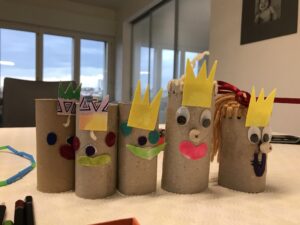INGLESE PER BAMBINI
La teoria del “learn by playing” si basa sull’idea che il gioco sia fondamentale per l’apprendimento, specialmente nei bambini. Giocando, i bambini esplorano, sperimentano e sviluppano competenze sociali, cognitive ed emotive.
Questa metodologia stimola curiosità e creatività, permettendo un apprendimento naturale e coinvolgente. A differenza dell’approccio tradizionale, il gioco promuove la motivazione intrinseca, rendendo l’esperienza positiva e significativa.
Ciao, sono Cris, appassionata di creatività e bambini! In questa attività unisco queste passioni alle mie esperienze: ho studiato in Australia, ho ottenuto la certificazione TEFL dal The TEFL Org (UK) e la formazione in Animazione Ludica dal Centro di Alta Formazione Jean Piaget. Sono arteterapeuta e attualmente frequento un Master in Educazione Interculturale.
Portate i vostri bimbi e scoprite insieme a me il potere del gioco nell’apprendimento dell’inglese!
———————————————————–

Creative workshops for all ages. Usage of different artistic materials and techniques. The goal is to spend time creatively and learn by playing.
Inspired by the pedagogy theory studied ma
inly by Jean Piaget, the Swiss psychologist who studied the children development by the theory of the cognitive development. The methodology brings the idea of “learn b
y playing” with the usage of toys (rules games and free play), art activities (relating the sensorimotor), music, affectivity rapport (rules and sensibility). For this study
and practice, I stand by the mentoring from Marise Piloto, Art-therapist, Art-Educator, Psychopedagogue, Pegagogue and Specilist in First Childhood Education. Master in Science of Education (2012)
More than 50 years´ experience in the Educational field in Brazil.
Pillars of development according to Piaget – and some examples with the creativity workshops:
Sensorimotor = Using the art activities we can observe how people relate with the materials. The way they organize themselvesf with the usage of the colors, pencils, scissors and the glue.
Affective = The conversations about respect and rules family, friends and desires. All the events related to the rapport affection among the participants and once respected we increase the confidence and it’s fundamental for the learning process.
Cognitive process = This is when the learning process happens itself. When he we start to think and organize ourselves, all of the perception about myself, the space, the time, the body, the others and the routine.